News 2011
Children's holiday program for the second time at the Bernstein Center
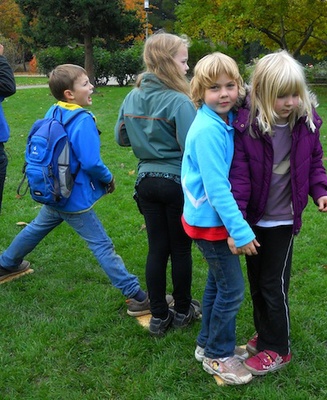
06.12.2011: During this year's autumn school break, the BCF again hosted the holiday program of the University's family service. In the first week of November, the children of university employees made use of Freiburg’s Schlossberg as the lift-off place for self-made kites. The Bernstein Center, located at the foot of the hill, made an ideal base for this.
State Teaching Award for Janina Kirsch: Baden-Württemberg honours successful teaching concept
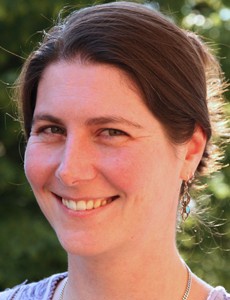
01.12.2011: Janina Kirsch, Teaching & Training Coordinator at the Bernstein Center Freiburg and lecturer at the Faculty of Biology of the University of Freiburg receives the Teaching Award 2011 of the Federal State of Baden-Württemberg, which is endowed with 50,000 EUR.
Divide and compute: Scientists find explanation for special wiring structure between two brain regions
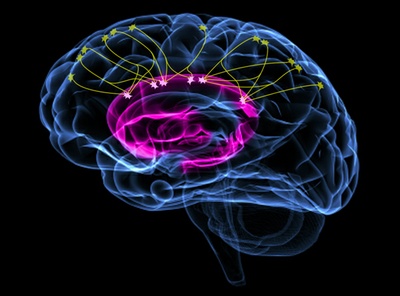
28.11.2011: Although the cortex, the outer layer of our brain, is commonly seen as the seat of cognition, other areas are involved in thought processes and behaviour as well. Whenever we need to make a decision or select a course of action from several alternatives, communication between the cortex and a structure called the striatum plays a crucial role. The peculiar wiring between these regions has been known for some time, but a study by Man Yi Yim and colleagues from the Bernstein Center at the University of Freiburg for the first time provides an explanation how this kind of connection serves a specific purpose. Their work has been published in the latest issue of PLoS Computational Biology.
Third Place in National Health Science Slam: On November 8, Bernstein Center PhD student Sarah Jarvis participated in the national finals in a "Science Slam" dedicated to health research and won third place.
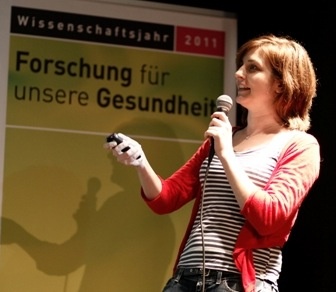
24.11.2011: "From a kick to a bang: Putting together the Big Brain Theory" – with this topic Sarah won over the audience and came third in the national finals of the "Science Slam in the Year of Health Research". Her ticket to present in Germany's capital was a successful participation in the regional science slam for Southern Germany. Henning Beck from Ulm University, who came first in the Southern regional contest, won the national competition – also with a neuroscientific topic.
CorTec: University Spin-Off on its Way into the Future of Neurotechnology
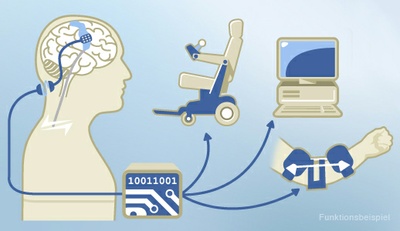
15.11.2011: CorTec is developing a neurotechnological platform for measuring and stimulating brain activity. With the seed investment and public subsidies which the Spin-Off from the University of Freiburg has just received it can go on with its development towards a clinical application of the platform system and bring it to market maturity.
Crippling rhythms of the brain: Network model reveals new insights into causes and possible treatments of Parkinson’s disease
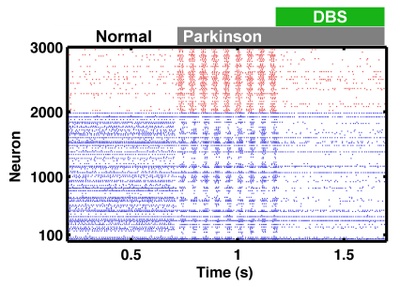
07.11.2011: Although Parkinson’s disease is one of the most common neurological disorders, its causes at the level of neuronal mechanisms are still poorly understood. Electrical stimulation has proven to alleviate many symptoms, but how exactly it achieves this, remains a mystery. Arvind Kumar and colleagues at the Bernstein Center Freiburg now provide a unified explanation of how Parkinson’s symptoms arise, how deep-brain stimulation (DBS) can counteract them, and how the method can be improved. Their study appears in the current issue of “Frontiers in Systems Neuroscience”.
This semester: BrainLinks – BrainTools Public Lecture Series [in German]
![This semester: BrainLinks – BrainTools Public Lecture Series [in German] This semester: BrainLinks – BrainTools Public Lecture Series [in German]](https://p4test20.uni-freiburg.de/news/2011/20111017-blbt-lecture/@@images/72ebbdf5-ebbc-417f-9db1-d38494652828.jpeg)
17.10.2011: This winter semester, the University of Freiburg will host a lecture series on Neurotechnology. The public lectures (which are held in German) will span the whole breadth of aspects that are important in this field, including biology, engineering, and medical sciences.
Bernstein Center Freiburg at the "Science Days" 2011
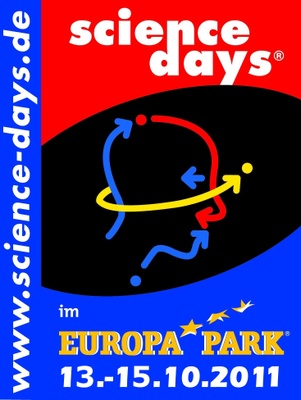
12.10.2011: This year, the Bernstein Center will be present at the "Science Days" that are taking place October 13-15 in the EuropaPark Rust. Through a game, school pupils will learn how neurons cooperate in the brain.
Bernstein Conference 2011 in Freiburg: How Does the Brain Encode Information?
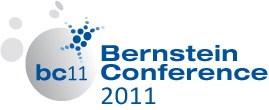
22.09.2011: Computational neuroscience is an interdisciplinary field of research that aims at a better understanding of the principles of brain functions. From 4 to 6 October 2011, over 400 scientists from around the world will be meeting in Freiburg for the "Bernstein Conference on Computational Neuroscience and Neurotechnology". [more information in German]
Call for Contributions to Frontiers in Computational Neuroscience

08.08.2011: BCF researchers organize a "Research Topic" in open access journal. Ad Aertsen, Stefan Rotter, Arvind Kumar und Stefano Cardanobile are organizing a "Research Topic" (formerly known as "Special Topic") in the journal Frontiers in Computational Neuroscience.
BCF PhD students receive CNS poster prizes
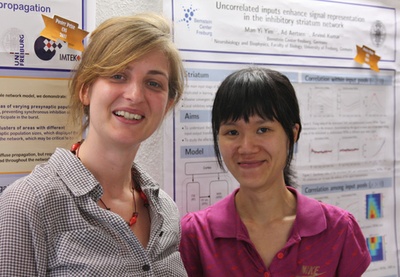
05.08.2011: At the 20th annual Computational Neuroscience meeting, Susanne Kunkel, Man Yi Yim and Sarah Jarvis were awarded prizes for their poster presentations.
Getting a grip on grasping: Scientists from Freiburg decipher brain commands for different grasp types
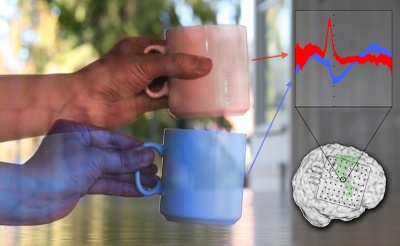
22.07.2011: Quickly grabbing a cup of coffee is an everyday action for most of us. For people with severe paralysis however, this task is unfeasible – yet not “unthinkable”. Because of this, interfaces between the brain and a computer can in principle detect these “thoughts” and transform them into steering commands. Scientists from Freiburg now have found a way to distinguish between different types of grasping on the basis of the accompanying brain activity.
CNS*2011 Workshops organised by BCF members
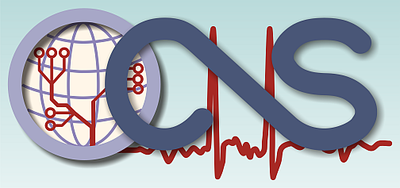
17.01.2011: At the conference CNS*2011, members of the Bernstein Center Freiburg will co-organise two workshops and one tutorial.
Teaching award for Janina Kirsch: University of Freiburg honours BCF staff member’s excellence in teaching
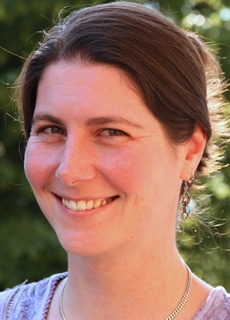
22.06.2011: The senate of the university has announced this year’s recipients of its teaching awards. The prize is given to educators whose courses are outstanding both in their content as well as their didactic value, or make use of innovative teaching methods. In 2011, the three awardees are Jan Korvink (IMTEK), Bent Gebert (German Seminar) and Janina Kirsch, the Teaching & Training Coordinator of the Bernstein Center Freiburg.
How does network structure shape brain activity? : New article in PLoS Computational Biology relates correlations in the activity of nerve cells to the detailed structure of the underlying network
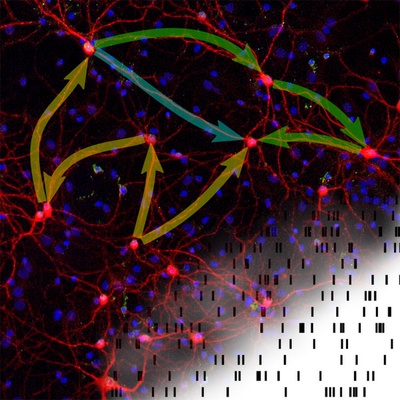
20.05.2011: Despite recent advances in our understanding of brain function, it is still largely unknown how activity in the brain’s cortex ultimately contributes to our mental abilities – to perceive, to remember, or to think. It is widely accepted, though, that neurons cannot achieve any of these functions in isolation. Rather, they have to partner up with others. As groups or larger populations of neurons orchestrate their activities, this is accompanied by a certain degree of temporal coordination between the involved signals. In data analysis this leads to so-called “correlations”.
Article by BCF members in PLoS Computational Biology on learning from dopamine signals
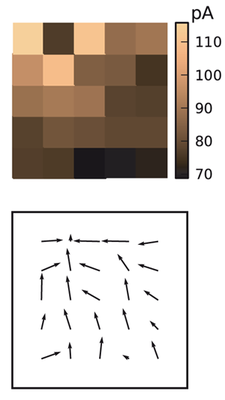
16.05.2011: Wiebke Potjans, alumna of the BCF, has published together with members Markus Diesmann and Abigail Morrison the paper "An Imperfect Dopaminergic Error Signal Can Drive Temporal-Difference Learning". Their research paves the way for further investigations of the dopaminergic system in reward learning in the healthy brain and in pathological conditions such as Parkinson's disease.
BCF PhD student receives stipend, participates in Google’s „Summer of Code“: Yury Zaytsev sets out to improve development cycle of NEST simulator
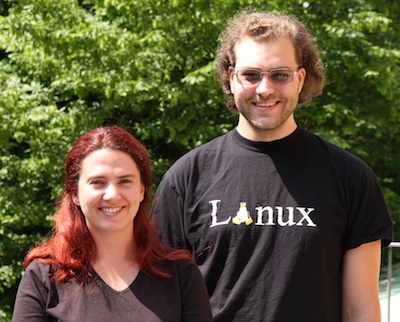
03.05.2011: On April 25, Google announced this year’s participants within the Summer of Code, a global programme that offers student developers stipends to contribute to various open source software projects. This year, only about 1,100 ambitious students worldwide will receive such a grant. One of them is Yury Zaytsev, PhD student at the Bernstein Center Freiburg.
Thinking outside the column: BCF members publish in "Frontiers in Neuroscience", new insights into brain structure reveal new facets of information processing in the nervous system
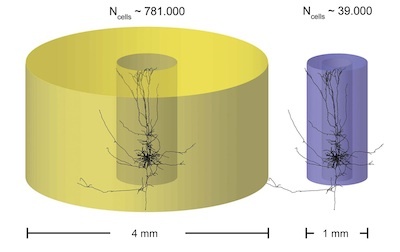
28.04.2011: For more than 50 years, a dominating assumption in brain research was that nerve cells in the cortex of the brain are organised in the form of microscopically small columns. Subsequently, it became a textbook standard that connections are created predominantly between nerve cells within these columns. In a review article for the journal “Frontiers in Neuroscience”, Clemens Boucsein and Martin Nawrot – together with their colleagues from the Bernstein Centers in Freiburg and Berlin – show that this view has to be revised: Input from cells that lie outside this column plays a much more important role than hitherto assumed.
Masked fears: New article by BCF scientists in PLoS Computational Biology explains the origin of fear processes in the brain – and why it is so difficult to overcome them
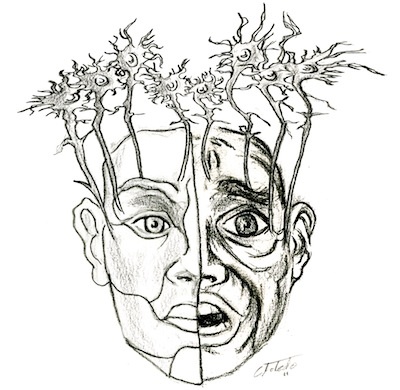
18.03.2011: Fear is a natural part of our emotional life and acts as a necessary protection mechanism. However, fears sometimes grow beyond proportions and become difficult to shed. Scientists from Freiburg, Basel and Bordeaux have used computer simulations to understand the processes within the brain during the formation and extinction of fears. In the current issue of the scientific journal PLoS Computational Biology, Ioannis Vlachos from the Bernstein Center Freiburg and colleagues propose for the first time an explanation for how fears that were seemingly overcome are in reality only hidden.
How clear is our view of brain activity? : BCF researchers publish article in "Human Brain Mapping", demonstrating the large influence of filtering algorithms on results in brain imaging
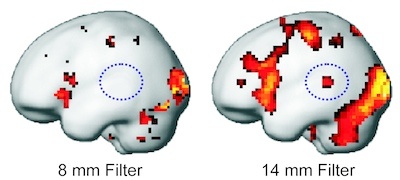
17.03.2011: Imaging techniques have become an integral part of the neurosciences. Methods that enable us to look through the human skull and right into the active brain have become an important tool for research and medical diagnosis alike. However, the underlying data have to be processed in elaborate ways before a colourful image informs us about brain activity. Scientists from Freiburg and colleagues were now able to demonstrate how the use of different filters may influence the resulting images and lead to contradicting conclusions.
BrainLinks – BrainTools : A research proposal by the University of Freiburg on hybrid brain-machine interface systems has been invited to enter the second round of the Excellence Initiative.

02.03.2011: On March 2, 2011, the German Research Foundation (DFG) and the German Council of Science and Humanities presented the names of institutions that may enter a full proposal for the second round of the Excellence Initiative. With the Excellence Initiative, the Federal Government and the federate states support outstanding research at universities in Germany.
Successful presentation at the FameLab: PhD student from BCF qualifies for national finals
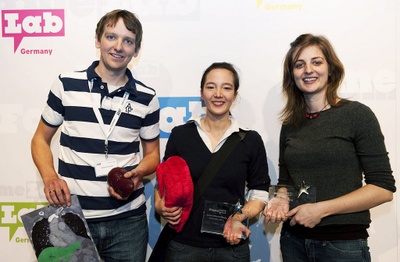
01.03.2011: Explaining a complex scientific concept with only three minutes at your disposal – this was the challenge for those young scientists who entered the science communication contest FameLab. Sarah Jarvis from the Bernstein Center at the University of Freiburg mastered this task especially well in Karlsruhe on Friday: She won second place in the regional round, thus qualifying herself for the national finals.
Nature Neuroscience publishes article by BCF member
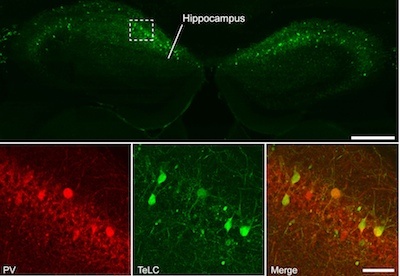
17.02.2011: Lichtenberg Professor Marlene Bartos from the Institute for Physiology I and the Bernstein Center of the University of Freiburg and colleagues Peer Wulff from the University of Aberdeen and William Wisden from the Imperial College London describe how they were able to specifically switch off inhibiting “interneurons” in the hippocampus of mice - and how this affected the animals' memory formation.
BCF member receives research award: Jens Timmer, physicist at the University of Freiburg and member of the BCF, received the Hector research award.
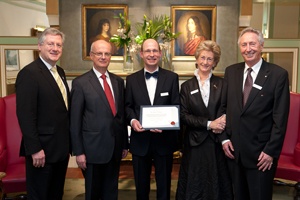
17.02.2011: He shares this honour with two other scientists. The award comes with a prize money of 150,000 € for each of the laureates. The Hector Foundation II awarded the prize in recognition of both Timmer's groundbreaking research and his merits in teaching.


